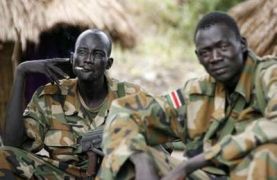SPLA’s transformation from rebel to conventional army
August 9, 2008 (JUBA) — At the new headquarters of the Sudan People’s Liberation Army (SPLA), some 10km north of Juba town, signs mark the finance, administration and operations directorates.

It is a new look, and a new way, for the former rebel movement that fought for liberation in the forests of Southern Sudan for two decades.
“When we started as guerillas, we walked from Sudan to Ethiopia, carrying food and ammunition on our heads,” said Col Kamilo Tafeng of the SPLA’s new directorate for political and moral orientation. “Now, with the signing of the Comprehensive Peace Agreement, the SPLA has been transformed into a conventional army … There is a tremendous change.”
The 2005 peace deal between the Southern rebels and the Sudanese government recognised the SPLA as the official army of a semi-autonomous Southern Sudan. Since then, the SPLA has been transforming itself, not only in appearance, but also in attitude.
Commanders and alternate commanders have taken on more conventional titles: colonels, brigadiers and generals. Uniforms have been standardised and a literacy campaign is encouraging all soldiers to go to school.
“During the war, we were thinking of fighting. Now we are thinking of human resource development,” Tafeng said.
Last week, the first batch of SPLA senior officials graduated from an eight-week course on international humanitarian law, which covered human rights, good governance and the role of a transformed army in peacetime, said Col Awur Maweil, coordinator of the SPLA’s colleges directorate.
The army, he added, is to create a new child protection unit in the coming weeks to ensure that no children are part of the SPLA’s ranks.
Pointing to new bookshelves in his office, Maweil looked around the well-furnished room: “This is what we have been dreaming of. It was difficult. It was hard, but we are on that track.”
Military restructuring and reform in southern Sudan is largely funded by the southern government’s share of oil revenue, but external sources of funding include the US government – which has earmarked some US$41 million in 2008.
LACK OF DISCIPLINE
However, there are challenges and progress is sometimes slow.
“I was a rebel for 21 years,” said SPLA spokesman Maj Gen Peter Parnyang, wearing a dark green uniform and beret, red collar tabs denoting his new rank. “Transforming people is not a simple job.”
Observers speak of a continued “war mentality” that results in aggressive behaviour among soldiers and officers.
“There are repeated reports of a lack of discipline by certain members of the SPLA,” David Gressly, head of the UN team in Southern Sudan, told IRIN. “This is well-known within the SPLA and senior leadership as well, and something they would like to bring better under control.
“They need to move away from a situation where some people fear either the police or the army.”
Gressly said the army was also struggling to pay its soldiers on time and to disarm excess forces that were absorbed by the SPLA as part of the peace deal. The command and control system needed to be strengthened, he added.
“In the West they say Rome was not built in one day,” the SPLA’s Tafeng said. “For 21 years, the SPLA has been a guerilla army. You can’t expect it to change in six years [since the interim peace agreement].”
POLITICS
The political wing of the former rebel movement, the Sudan People’s Liberation Movement (SPLM), is also re-branding itself as it vies to be a national political party. In three years, a government of Southern Sudan has been created from scratch, complete with a legislative assembly, ministries and departments.
“That alone . to be achieved within three years is really incredible,” said Malick Ceesay, who has worked for the UN Mission in Sudan (UNMIS) for three years. “They really deserve a pat on the back.”
The party has said it would contest every position in the 2009 elections, including the presidency.
Speaking to IRIN in November 2007, Southern Sudanese Vice-President Riek Machar said: “We want to win the election of 2009 as Sudanese and capture power in Khartoum through elections.”
Ceesay, however, warned that both the SPLA and the SPLM needed continued support.
“There is still a lot of work to be done,” he said. “[They] need capacity-building and capacity-strengthening, in order for them to realise their dreams of being a full-fledged functioning government.”
(IRIN)
